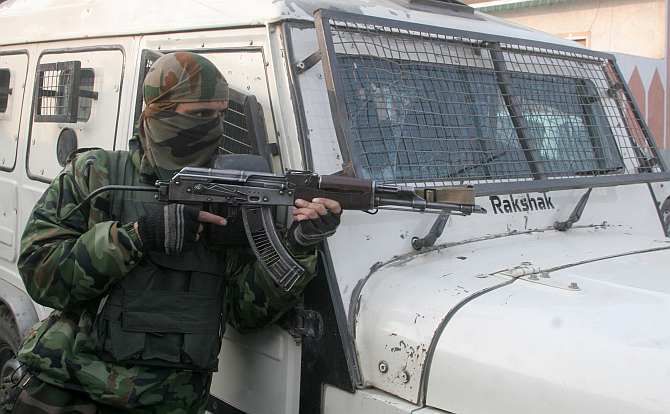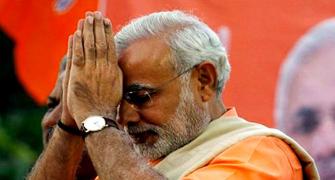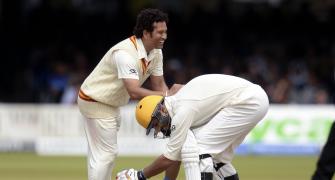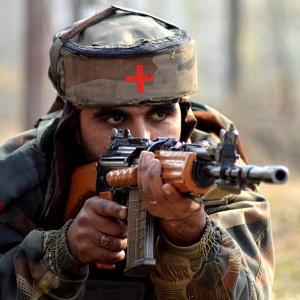
Young soldiers blame commanders for the debacle at the Uri army camp. Ajai Shukla reports
Anger is bubbling among junior army officers after eight soldiers died in a militant strike on a military camp near Uri, in Jammu and Kashmir anger. The over-cautious commanders have tied their hands, they say.
In a WhatsApp message that is racing through army networks, the Uri debacle has been blamed on tight operational restrictions allegedly imposed after two Kashmiri boys were mistakenly shot dead on November 3 by soldiers manning a check point near Chattergam village, in Anantnag district of south Kashmir.
Then, in a swift attempt to quell public outrage, the army had ordered an inquiry that found nine soldiers of 53 Rashtriya Rifles culpable. Northern army commander, Lieutenant General D S Hooda, publicly admitted the army had made a mistake.
Days later, on November 13, an army court martial sentenced five soldiers, including two officers, to life imprisonment for killing three innocent Kashmiris in a fake encounter in the Macchil sector of north Kashmir in 2010.
In the bitter WhatsApp message, an unidentified officer has directly held his top commanders responsible for the Uri debacle. "As per reports, soldiers on the sentry duty on the army camp (at Uri) did not fire upon the approaching terrorist vehicle due to caution imposed on them after the Anantnag incident (sic)", says the WhatsApp message.
The message goes on: "When (the) Anantnag incident took place last month, corps commander of 15 corps and Army Commander of Northern Command had both called it a mistake… Should not the Army Cdr (commander) and Corps cdr (commander) consider resigning for this goof up (sic)."
"Now, what do they have to say? They had betrayed their own soldiers, who became cautious and the result is for everyone to see."
Highlighting a worrying faultline, the message demands: "Generals should stop playing to (the) gallery and mind their own business and allow soldiers to do their job (sic)."
Such bitterness is growing in combat unit and sub-unit commanders, who are caught between senior officers' demands to "deliver results", i.e. to kill militants; while at the same time uphold the human rights of locals, most of whom sympathise with militants, if not actively support them.

The army is scrambling to counter this unprecedented "social media" crisis. While nobody is speaking on the record, Business Standard learns the army is responding on social media, putting out a detailed account of the Uri incident. The aim is to prove that the militants benefited from laxity rather than from imposed restraints.
Lieutenant General Syed Ata Hasnain, a highly regarded former corps commander in Srinagar, says, "It is unfair to blame top commanders for demanding restraint. Every officer knows exactly what restraint implies; and it does not restrict legitimate use of force against militants."
Neither do accounts of the Uri strike support the view that soldiers' were operationally restrained. The attack began at 3 am, a time when civilian movement is totally banned and every stranger is considered suspicious.
Senior commanders in Kashmir have stoutly resisted pleas to lift the Disturbed Areas notification from large parts of Jammu and Kashmir, which means the Armed Forces Special Powers Act, 1990 would no longer apply in those areas. Even so, the army hierarchy is increasingly intolerant of human rights violations.
The WhatsApp message bitterly states: "We ought to accept such mistakes when we deploy the army for restoration of the situation. Everyone must understand the real purpose of AFSPA. It is meant to cover unintentional mistakes made by soldiers in the course of the performance of their duty."
The WhatsApp message strongly reflects the soldiers’ viewpoint that they are doing a thankless job for seniors, leaders and a public that neither understands nor sympathises with the army.
The officer writes, "Why does not this nation and its leaders understand the nuances of this "Designer war" heaped upon India by Pakistan since 1989? Unfortunately, even most military minds, both serving and retired, have failed to understand the reality of this war. It has nothing to do with "law and order"; it is war, sir! Most important, it is for generals to understand and grasp its characteristics and stop reacting to civilian hue and cry (sic)."











